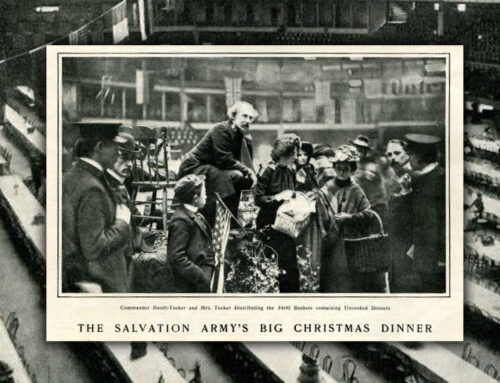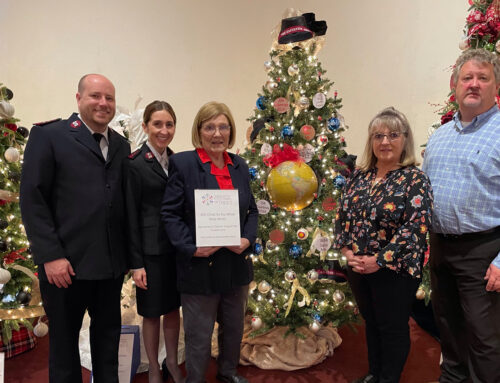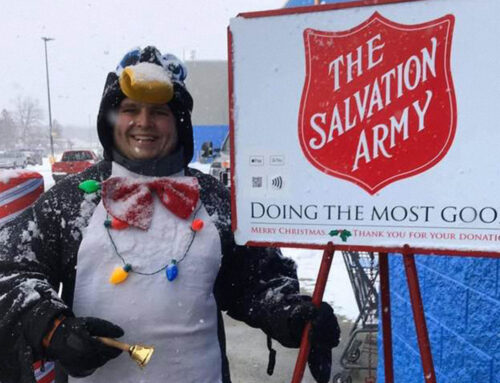“Thank you, Jesus!”
by Warren L. Maye

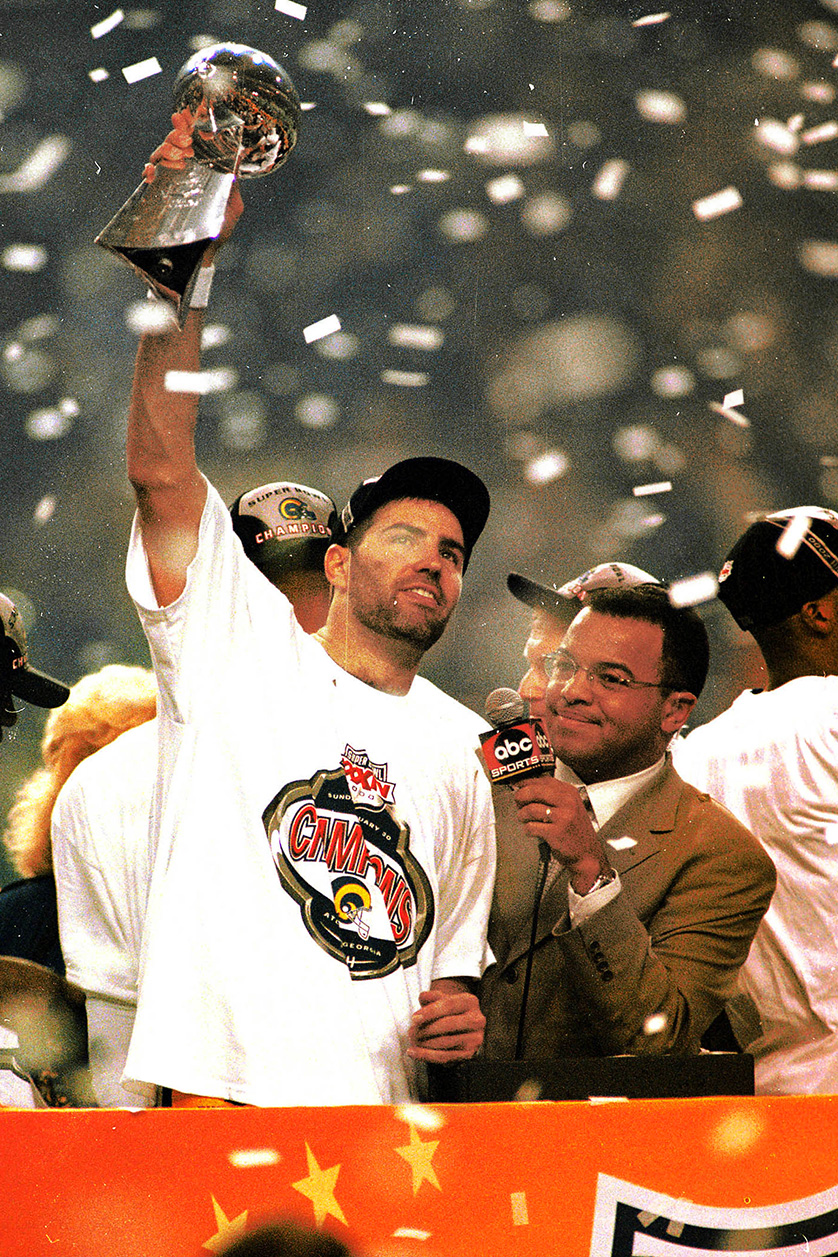
SUPERBOWL XXXIV post-game interview with Kurt Warner
Kurt Warner’s outspoken love for Christ is a story for the history books, and a most unlikely scenario that demonstrates how God works in mysterious ways.
The Christian faith of Pro Football Hall of Fame quarterback Kurt Warner is woven into the plot of “American Underdog.” Following its initial theatrical debut on Christmas day, 2021, it is now available to stream from your couch. Critics said, “American Underdog sticks to the standard inspirational sports drama playbook—and proves once again that it can be very effective in the right hands,” alluding to brothers Jon and Andrew Erwin who directed the film and also wrote “I Can Only Imagine.”
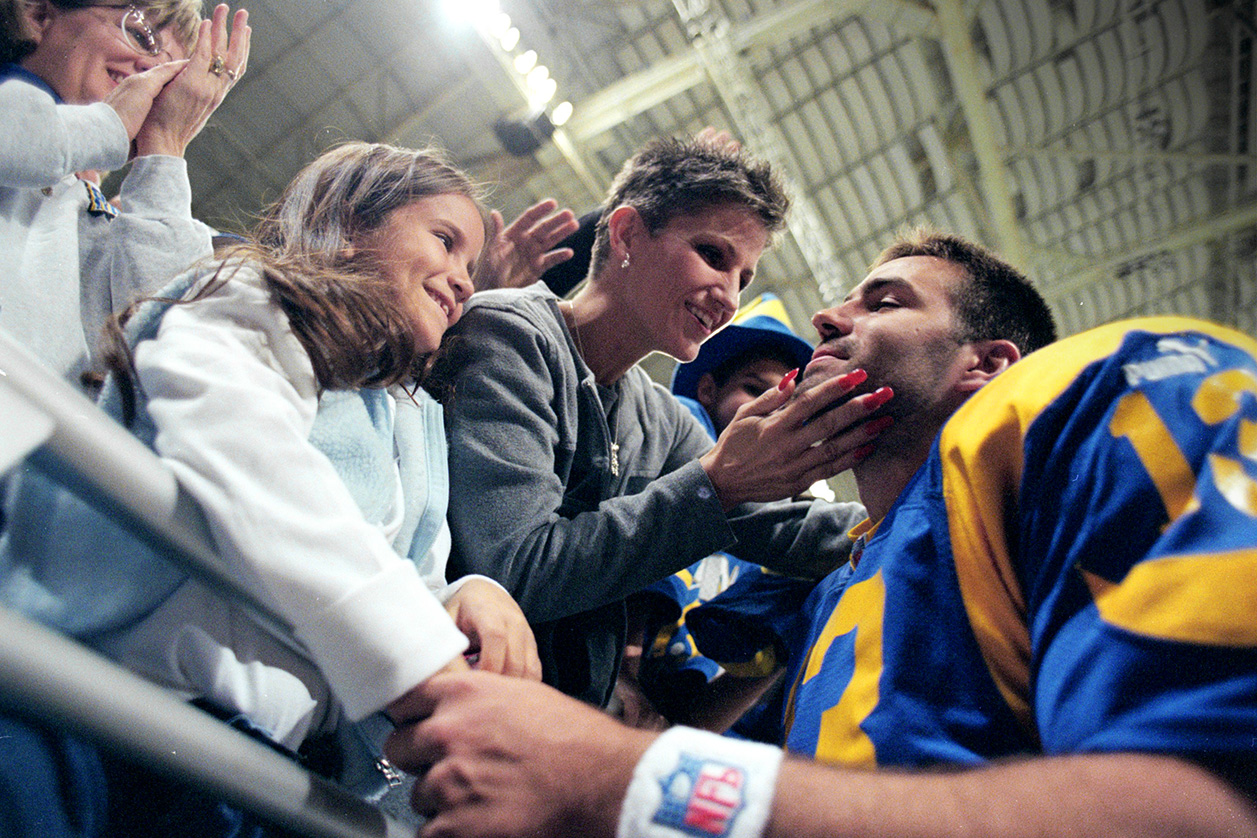 The screenplay describes how Warner (played by Zachary Levi, “Shazam”) is overlooked during the 1994 NFL draft. His darkest moments seemingly come when he then must take a job as an aproned–clad grocery store clerk.
The screenplay describes how Warner (played by Zachary Levi, “Shazam”) is overlooked during the 1994 NFL draft. His darkest moments seemingly come when he then must take a job as an aproned–clad grocery store clerk.
His inspiring comeback begins when he becomes an Arena Football League quarterback, is later discovered by, but is cut from the Green Bay Packers, and then is hired by the St. Louis Rams. Miraculously, he goes on to become a two–time NFL MVP (1999, 2001), Super Bowl champion, and is later inducted into the Pro Football Hall of Fame after a stunning 12–year career. Today, he is the only undrafted NFL player to have accomplished these distinctions.
Defining the film
Many critics debate whether “American Underdog” is about football or family or faith. In response, Jon Erwin, screenwriter and director of the movie, says the film is as much about faith as it is about football. The PG–13 movie is designed to inspire and to bring families together rather than separate them by secular movie ratings. “It is really meant for people to laugh and cry, and to come out of the theater saying, ‘You know, maybe my dream is possible too. Maybe I shouldn’t give up. Maybe I shouldn’t quit.’ Because one of the great things the story shows is that Warner never gave up.”
Warner himself said in an interview with the Evangelical Press Association (EPA), “I love the title. Being an underdog is really what the movie is all about. It’s about a family of underdogs. Take my wife Brenda’s story. When we met, she was a single mom with two kids and going through many challenges. Our oldest son, Zach, had suffered a traumatic brain injury when he was just four months old.” The film also tells how Brenda (played by Academy Award winner, Anna Paquin), lost both her parents in a horrific tornado. Kurt’s parents are also part of the movie’s backstory.
Behind the story
In the final scene of the movie, Warner’s character kneels in the endzone after a touchdown and prays for a moment before standing to receive the cheers of the crowd and congratulations from teammates.
However, Warner is known for the unabashed thanks he gave to Christ after the 1999 Super Bowl when he held up the winner’s trophy and said, “First things first—I’ve got to give praise and glory to my Lord and Savior up above—Thank you, Jesus!”
At the time, critics wondered what he was thanking Jesus for or what role faith played in his career. So, when Warner was inducted into the Pro Football Hall of Fame in 2017 after taking two teams to Super Bowl appearances, he further explained, “Now, many felt I was thanking Him for orchestrating a Super Bowl win or making my passes fly straighter or causing my opponents to make more mistakes. But those people had it all wrong.
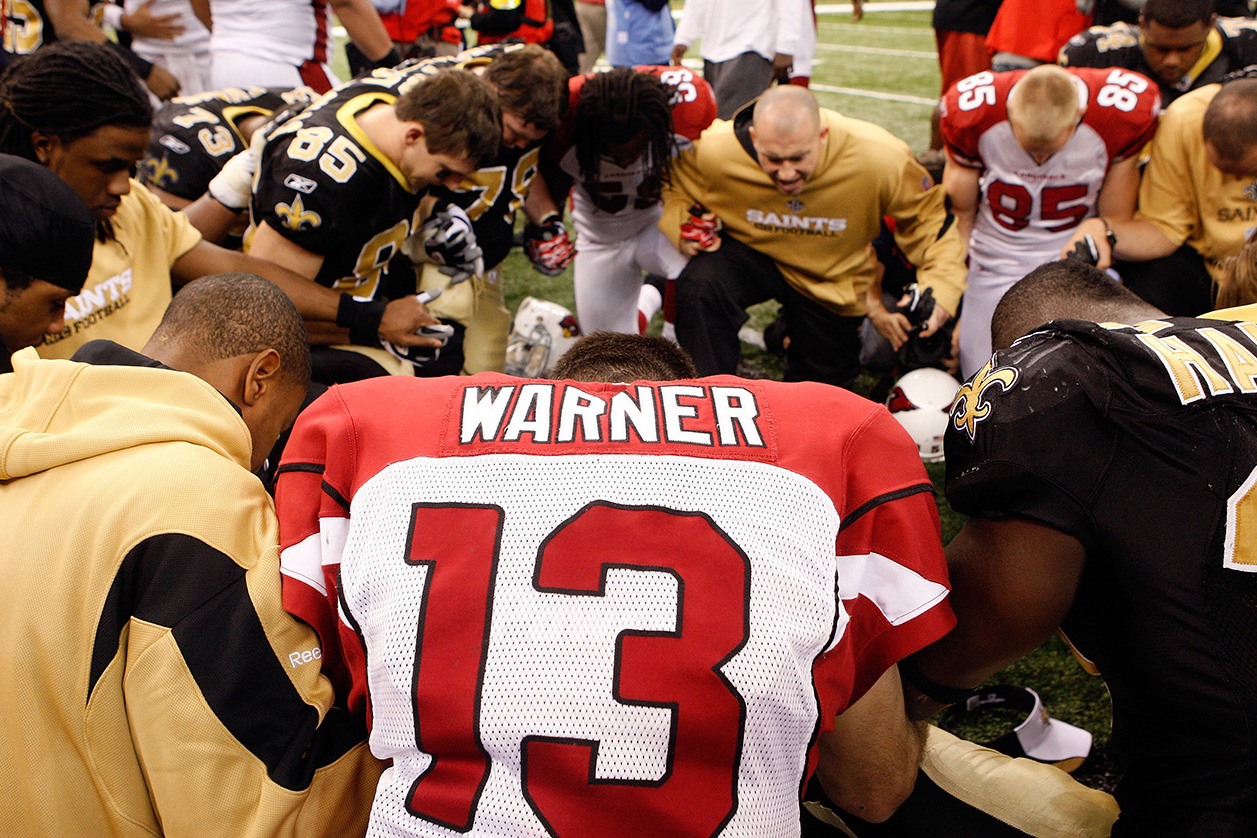
“The gesture was my way of acknowledging how fortunate I considered myself for the moment He had given me. Thanking Him for the trials, which prepared me for this platform, for showing me that, with Him, the impossible becomes possible, and for choosing me as the lead in this once–in–a–lifetime role.
“Now, love it or hate it, that opening scene captured the imagination of the sports world, and those words became the heart of my story. The rest, as they say, ‘is history.’
“That brings us to this, the famous last words, and the only place this extraordinary journey can end. You know, His final moment was for me; mine is for Him. Thank you, Jesus!”
A difficult childhood
Warner’s life as an underdog began when he was a child. “Playing sports allowed me to feel like a kid, which was nice, because in some ways I had to grow up quickly. My parents divorced when I was four, and the way I remember it, I didn’t see my dad for a while after that happened,” Warner wrote in his autobiography All Things Possible: My Story of Faith, Football, and the First Miracle Season. “It was a tough transition for me, as I’m sure it is for all kids in that situation. The divorce made me feel extremely protective toward my mom, and I became very self–motivated.
“Even today, I don’t depend on other people to tell me how well I’m doing because I measure myself against my own standards,” Warner continued. “My mom, Sue Warner, is a strong woman whom I love very much. She sacrificed a lot to raise my brother and me in a positive manner, and I believe that she gave us the best life she could under the circumstances.” Warner’s mom sometimes worked more than one job to make ends meet. “After the divorce, Matt and I had sort of an us–against–the–world mentality.”
In his EPA interview, Warner continued, “There is an underdog story in each one of us. Yet, we can overcome and accomplish some incredible things. That is what excites me about this movie.”
In the right hands
As the film was in production, another aspect of Warner’s personal story evolved; something that no audience, be they football fans, movie viewers, or readers of Warner’s biography had ever seen.
Despite Kurt’s success and even his devotion to Christ born out of his relationship with Brenda, he still felt like an underdog when it came to this. He still measured himself against his own standards. He still depended on himself rather than on others. Deep in his mind, it was still him against the world.
That ultracompetitive feeling was driving Kurt to call Jon at 4 a.m., to ask that he rewrite some dialog or change an action in one of the movie scenes.
At the time of the filming in March 2020, blizzard conditions covered much of Middle America. Oklahoma and Texas were particularly hit hard. It was also the height of the pandemic. Whole industries were being shut down, including the film business. The situation gave the Erwin brothers pause. They wondered if their movie would get snowed under.
“We called the Warners and said don’t come because flying in and out could be dangerous,” said Jon. “I thought that message got through until I woke up the next morning and a member of the crew at the hotel, called and said, ‘There’s a guy out shoveling snow in the parking lot, getting cars out. We’ve investigated and it’s NFL legend Kurt Warner. He’s literally out in the snow.’ He’s like, ‘I can do this, you know!’
“So, Kurt had that level of commitment,” Jon remembers. “He was literally shoveling cars out to get my people to the movie.” That force kept Kurt going; kept him proving himself to himself and to everyone around him. One could sense that he still had something important to learn and share.
Trusting the process
“I love that word trust because Brenda and I talk about it a lot,” said Kurt during a recent interview with SACONNECTS. “We would see different renditions of the movie along the way. It was so personal to me when I watched them. You know, the first time, I’m like, ‘Oh, they put that into the script!’ or I’d say, ‘Zach actually said it like this, not like that!’ I also got hung up on, ‘Oh, you didn’t say it exactly like I would have said it!’ So, it was hard for me in the early process of making this film because I was so connected to it.
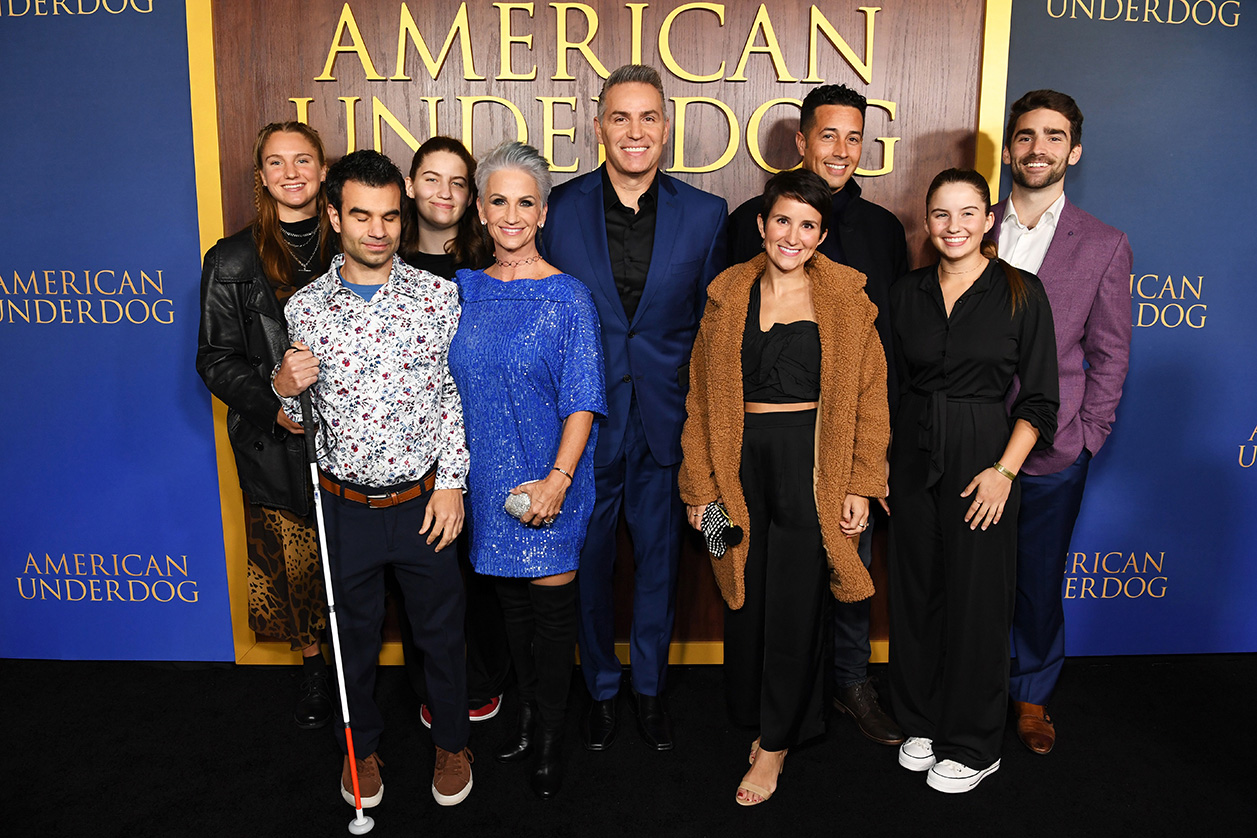
“At one point, Brenda said, ‘OK, this time we watch it, you’re gonna forget that it’s your story and you’re gonna sit back and just watch the movie. You’re going into a theater; you got your popcorn; just watch the movie!’”
Kurt followed Brenda’s advice and gradually realized that to successfully share his precious story with the world, he first had to let it go, put it in good hands, and trust the process.
“When I finally did that, it really took on a life of its own,” said Warner with excitement. “I realized how powerful it was. The vision that these two brothers had, you know, through that collaboration, they said ‘trust us; we got this!’
“When I stepped back and realized what they were doing, I saw the talent and I saw the gifts. They made the characters ‘us,’ but it was ‘them’ making it ‘us.’ It was ‘them’ being ‘them’ and how special ‘they’ are.
“That was the moment where I said to myself, Now, I get it. I could finally sit back and be proud of everybody’s role in this. Not because they made the movie that I necessarily wanted to make in the beginning, but because we made the right movie. It was the right movie because everybody’s doing ‘them’ while connecting ‘our’ story to it.” Kurt Warner learned to “stay in the pocket” the way he had done so many times on the field.
Building a treasure house
Today, Kurt and Brenda Warner are reaching out to help adults who struggle with intellectual and developmental challenges as does their son Zachary. To that end, they’ve launched Treasure House, a residential program based in Glendale, Arizona. They believe that all people, regardless of ability, have a purpose and call on their life. When provided with appropriate supports and opportunities, they can participate in meaningful and challenging activities, establish personal relationships, and contribute to society.
The Warners said that they have been inspired and amazed by all that their son Zachary has accomplished, despite the diagnoses and labels given to him. It is their love for him that gives them the passion and the vision to create an environment that will allow other people with such challenges to thrive as they share their gifts.
Treasure House encourages a strong emphasis on independence, respect, and community integration that will provide an optimal environment for residents to live, work, and enjoy recreational activities while being part of a larger family.
The Warners want to establish the Treasure House model as the ideal way to help adults with cognitive disabilities realize their full potential.

 Learn more about Treasure House, a unique active living community for young adults with cognitive and developmental disabilities, launched by the Warners in August of 2018. Visit
Learn more about Treasure House, a unique active living community for young adults with cognitive and developmental disabilities, launched by the Warners in August of 2018. Visit 
